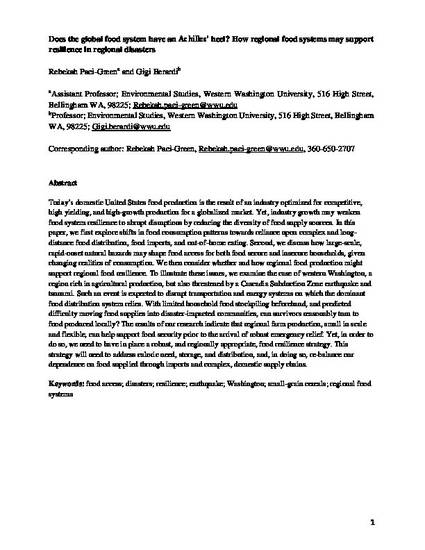
- food access,
- disasters,
- resilience,
- earthquake,
- Washington,
- small-grain cereals,
- regional food systems
Today’s domestic United States food production is the result of an industry optimized for competitive, high yielding, and high-growth production for a globalized market. Yet, industry growth may weaken food system resilience to abrupt disruptions by reducing the diversity of food supply sources. In this paper, we first explore shifts in food consumption patterns towards reliance upon complex and long-distance food distribution, food imports, and out-of-home eating. Second, we discuss how large-scale, rapid-onset natural hazards may shape food access for both food secure and insecure households, given changing realities of consumption. We then consider whether and how regional food production might support regional food resilience. To illustrate these issues, we examine the case of western Washington, a region rich in agricultural production, but also threatened by a Cascadia Subduction Zone earthquake and tsunami. Such an event is expected to disrupt transportation and energy systems on which the dominant food distribution system relies. With limited household food stockpiling beforehand, and predicted difficulty moving food supplies into disaster-impacted communities, can survivors reasonably turn to food produced locally? The results of our research indicate that regional farm production, small in scale and flexible, can help support food security prior to the arrival of robust emergency relief. Yet, in order to do so, we need to have in place a robust, and regionally appropriate, food resilience strategy. This strategy will need to address caloric need, storage, and distribution, and, in doing so, re-balance our dependence on food supplied through imports and complex, domestic supply chains.
